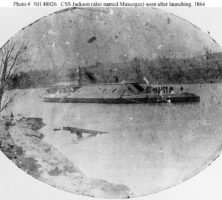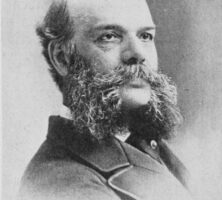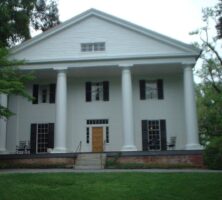James Dunwoody Bulloch, the primary naval agent of the Confederacy in Europe, oversaw the building of several ships designed to ruin Northern shipping during the Union blockade of the South during the Civil War. Born to a prominent Georgia family associated with historic Bulloch Hall in Roswell, Bulloch was the uncle of Theodore Roosevelt, the twenty-sixth president of the United States. The 1984 discovery of and subsequent research expeditions around the CSS Alabama, sunk during the Civil War in waters off Cherbourg, France, have revived interest in Bulloch’s life.

Photograph by Darby Carl Sanders, New Georgia Encyclopedia
Born in 1823 in Savannah, Bulloch was a great-grandson of Archibald Bulloch, a leader of Revolutionary forces and the first president of Georgia’s Council of Safety. His father, James Stephens Bulloch, remarried after his mother’s death and moved from the Georgia coast to Roswell. The younger Bulloch was in the U.S. Navy when Bulloch Hall was constructed and thus never lived there, but he did visit his father’s home. His half-sister Martha (“Mittie”) married Theodore Roosevelt Sr. and became the mother of the future president.
Maritime Career
Bulloch sailed for fifteen years in the navy, serving aboard various ships, including the United States, Decatur, and Delaware. In 1851 he married Elizabeth Euphemia Caskie, and the following year he began service on the USS Georgia, a civilian mail steamer under contract with the navy. In February 1853 he was promoted to ship’s master, his first command post, but was granted a furlough several months later, due in part to the poor health of his wife, who died in early 1854. During his furlough, Bulloch served aboard a commercial steamer for a shipping company based in New York, and in late 1854 he resigned from the U.S. Navy for good.
In 1857 Bulloch married Harriott Cross Foster of New Orleans, Louisiana, and the couple settled in New York. In his memoir Bulloch states that he was little connected to the South during this time.
Confederate Service
When Fort Sumter in Charleston harbor was fired upon in 1861, Bulloch volunteered to assist the Confederacy. Soon thereafter he and his family moved to Liverpool, England, which was to be his center of operations and his eventual permanent home.

Courtesy of U.S. Naval Historical Center
Bulloch’s charge was to buy and outfit vessels designed to disrupt Northern shipping and enable the South to equip its troops. He contracted right away for the CSS Florida and the CSS Alabama. The Alabama began cruising against Northern trade in August 1862 and was so powerful an enemy that she almost drove American shipping off the lanes until July 1864, when she was sunk off Cherbourg by the USS Kearsarge.
Holding the rank of commander in the Confederate navy, Bulloch had been switched from his intended post, commander of the Alabama, to acquiring ironclads for the Rebel navy. He had four ironclad rams and six fighting ships under construction when both England and France exercised terms of their neutrality treaties with the U.S. government and blocked delivery of the ships. Bulloch later was able to float a French ironclad (CSS Stonewall), but it reached America after the Confederate surrender at Appomattox, Virginia. He acquired several other ships that went against the Union blockade, and in September 1864 the CSS Shenandoah was launched against Union whaling fleets.
The Alabama has fascinated researchers and military historians because of its legendary assaults on Union ships. In twenty-two months the Alabama, which carried 120 men and 24 officers, cruised whaling grounds around the Azores and plied the shipping lanes along the eastern coast of the United States, the Caribbean, the Brazilian coast, and the South African coasts, and the Indian Ocean, the South China Sea, and the Bay of Bengal. The ship’s crew, under Captain Raphael Semmes, boarded 447 ships, captured 65 Union merchant vessels, and sank the USS Hatteras.
After the war Bulloch retired to Liverpool, where he lived with his daughter and son-in-law. He remained active in maritime affairs, including directing the Liverpool Nautical College and the Orphan Boys Asylum. In 1883 Bulloch published his memoirs, entitled The Secret Service of the Confederate States in Europe; or, How the Confederate Cruisers Were Equipped. He died in Liverpool in 1901.









